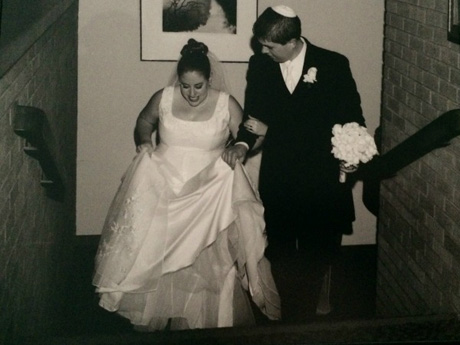

This story originally appeared on xoJane.com.
My husband and I celebrated our 12th anniversary this June. We’ve had a good run despite my over-thinking and his over-scheduling, so I did what we writers do: I wrote a neat and tidy article titled “12 Secrets Happily Married Women Know.”
I was feeling especially comfortable in my skin at the time. I’ve been running and lifting and eating (mostly) well, and I’m healthy. The warmth of summer — the rays that hit me in slices throughout the day, the constant comfort of my family around me, the looseness that comes with a lack of a schedule — all wore me down, softened my edges, sent me out of my comfort zone and for one teeny tiny moment, I set aside my deeply ingrained defense mechanisms.
I had met a friend for lunch the week before. She faced me across fresh shrimp and cold beer and we talked about our children and our writing, the threads that hold us together. “I never see candid photos of you,” she mused. The hair on my arms, my shoulders, and the back of my neck stood on end. “I’m not judging,” she added, “But I noticed that you like to have control over that.”
She was absolutely right in the non-annoying way that only heart-deep friends can be.
I do like to have control over photos that are taken — and shown — of me. I’m a selfie re-taker, a Facebook un-tagger, a strategic chin-hand-child placer, and I’m (almost) always the person behind the camera, rather than the one in front of it. When you’re fat, and you don’t want to be, you memorize these tricks of the trade.
So yes, my friend was right. I am normally so very careful about the photos I share, not necessarily for privacy, but definitely for vanity.
But this summer, I was softened. And when I wrote my article, I included wedding photos that I had never shared online before.
I used to hide them because of the way parts of my body looked in them. My chin (double), my waist (wide), my arms (thick). But I included them because, without my armor, I could see what had always been there — my husband and I look so happy in them. Joyful, really, and truly in love. And that’s what my article was about, so I embedded the photos, sent my article into my editor, and really and truly didn’t think about them again.
In the body image wars that women, that I, have with ourselves — this was a win.
When my article got some traction, I decided to take a peek at the comments it was getting. This is a cardinal rule never-ever meant to be broken. But I was curious and I (quite naively) thought, Bring it. I could take whatever commenters could possibly dish about my thoughts on marriage. And this is still true. What I couldn’t take, however, is what commenters — people, human beings — said about my body.
Here are a few screen shots I captured that day, or one of the days after that I went back and looked again (and again).
I peered at comments like these through splayed fingers, counted how many “Likes” these got as opposed to how many readers told these people to stop being like “that” — whatever “that” might be. Cruel, unnecessary, fat-focused. Behind the safety of my screen, I was keeping score — for my article or against my body. Because these are the two camps that the commenters joined.
I couldn’t stop looking. “Cut it out,” my husband said, shaking his head, desperate to help. But what could he possibly do or say to soften this, or to soften me again?
I kept going back to check on it — like a tended fire that I needed to know if it would be smothered or fanned.
On good days, I started dialogue about internet comments, misogyny, and body image. On better days I began writing this article. But on hard days, which was most of them, I cried.
I cried for the words flashing through my mind — Fat. Ugly. Heifer. — and I cried for the way that I averted my eyes whenever I passed a mirror. I cried trying to figure out what my husband thought reading, seeing, feeling those words and how they would make him read, see, and feel about me. I cried for my daughters seeing those words said about their mom or ever hearing them, or even worse thinking them, about themselves.
And I cried for the desire that I had to show photos of myself today — Look! I’m “better” now! Not perfect, but not as fat as that! My self worth suddenly became entrenched in those words. I was tethered. I was also perpetuating the exact same thing those commenters were — fat is bad, body commenting is normal, and valid. I cried a lot about that.
Our society’s incessant focus on women’s bodies and the way we deem it necessary and appropriate to comment on them is, at best, misguided, and at worst, damaging.
There are very few times that I think it’s okay to comment on a woman’s body — in a complimentary or in a negative way. As a mother and as a woman, I think we all need to stop that conversation, to consider it taboo.
People say that the way we’re spoken to becomes our self-talk. In my experience this is very true. And as much as we’re loved, it’s incredibly difficult to undo this.
I can’t tell you how body talk makes every woman feel, but I can tell you that staying away from body compliments and body bashing, body noticing and body commentary leaves room for the kinds of words that we want the women — and the girls — in our lives to hear, to repeat, to have written to them by the typewriters in their own minds. And that, can’t hurt.
Galit Breen is a Minnesota writer. She has had essays published in several magazines and anthologies, co-directs the Listen to Your Mother Show in the Twin Cities, and writes for allParenting, Everyday Family, Mamalode Magazine, and The Huffington Post blogs.
More Must-Reads from TIME
- Where Trump 2.0 Will Differ From 1.0
- How Elon Musk Became a Kingmaker
- The Power—And Limits—of Peer Support
- The 100 Must-Read Books of 2024
- Column: If Optimism Feels Ridiculous Now, Try Hope
- The Future of Climate Action Is Trade Policy
- FX’s Say Nothing Is the Must-Watch Political Thriller of 2024
- Merle Bombardieri Is Helping People Make the Baby Decision
Contact us at letters@time.com